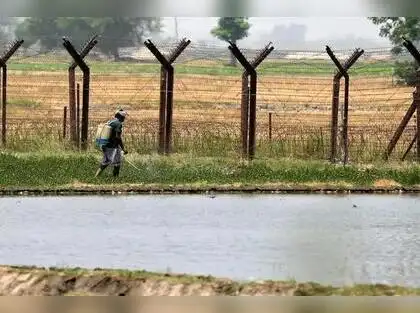Farmers living near the nearly 200-km-long international border in Jammu and Kashmir are working hard to finish their harvest. They are feeling pressure after a recent terror attack in Pahalgam that resulted in many deaths. In the districts of Jammu, Samba, and Kathua, there’s around 1.25 lakh hectares of farmland that can be affected by shelling from across the border.
Villages like Treva, Mahashe-de-Kothe, Chandu Chak, Gharana, Bulla Chak, and Korotana Kalan are seeing families hustle day and night to collect their crops, dry the grain, and pack it to sell to mills. Most of the wheat and other crops have already been harvested, but farmers are racing against time to finish the rest, especially since they must prepare it for delivery.
Santosh Singh, a 50-year-old farmer from Treva village, shared his worries, saying, “We are racing against time to finish harvesting. There’s very little time left.” Treva is very close to the border, just 1.5 km away, and this puts them at risk from the Pakistan Rangers. Since the tragic attack on April 22, which led to 26 fatalities, farmers in Treva have been feeling anxious, leading local authorities to take action.
The local tehsildar has organized 20 harvesters to help speed up the process. Rakesh Kumar, another farmer from Treva, mentioned, “Ninety-five percent of the harvesting is already done, but we still must be quick.”
Radhika Devi from Suchetgarh shared her family’s achievement of packing over 300 bags of wheat in just days, emphasizing the urgency. Mill owners are offering good payments and quickly moving the bags to safer places. Another farmer, Tarika Devi from Korotana Kalan, echoed the urgency—reminding others that they could face shelling at any moment.
Finding farm workers has become difficult; typically, laborers from Bihar and Uttar Pradesh come to help during this busy time, but they are refusing to work in the dangerous conditions, according to Kuldeep Kumar, a farmer from Suchetgarh.
The farmland from Paharpur in Kathua district to Chicken’s Neck in Jammu district is always at risk. Farmer Sardar Teg Singh from Chandu Chak stated, “We live in fear, but we’re getting used to it. This time, we are better prepared. We can rescue ourselves, our animals, and our crops too—unlike in the past.”
The Basmati Rice Growers Association of R S Pura noted that 1 to 1.25 lakh hectares of land, mostly used for famous Basmati rice, are often affected by cross-border shelling. India and Pakistan had agreed on a ceasefire in February 2021, but the recent terror strike has brought back fears of earlier conflicts.
Faqir Chand, an 80-year-old farmer from Mahashe-de-Kothe village, shared his opinions, saying, “We believe it may be worse than the shelling and firing in 2021. It feels like war, like it was back in 1971. We’re ready to support our soldiers bravely.”
For farmers in Jammu’s border areas, harvest time, which is usually a joyful season, is now filled with worries and a sense of urgency.
Farmers on the Jammu Border Rush to Harvest Amid Rising Tensions





Leave a Reply